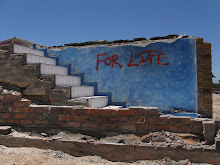Today I went to the post office to mail my absentee ballot. I had almost forgotten that voting was work. I spent the whole morning researching the candidates for the state and municipal offices. These are positions that I know are important, like the state supreme court justices who serve for 12 years, and the mayor of my hometown. But I felt completely out of the loop when it came to choosing. I would say it’s because I’m overseas, but I remember the same feeling on the day of the primaries back home.
Nevertheless, I felt obligated to go through with it, to walk my envelope fifteen minutes down Main Road to the post office, and to pay R27.90 for an international stamp. After all, I was the one who put up posters all over campus appealing to Americans to get their absentee ballots.
I did not exactly make these signs out of a pure longing to increase participation in democracy. Demographics motivated me: American students abroad, in Africa, many of them studying international development… I could picture how most of their ballots would turn out, at least in the presidential election. But I do generally think it’s a good idea to vote, at least if you follow current events, which is also a good idea. My housemate, who doesn’t like to discuss politics so I’ll keep him nameless, has decided that he will not vote. I argued with him a bit, for the sake of understanding his perspective. He said there’s no way to really know the candidates before they’re in office, plus he’s tired of people saying that people died so that he could vote.
The signs were quite successful – most of the confetti strips are gone by now. I didn’t really expect such success, and I expected a little more commentary. I found a “LOSERS” scrawled on one, but other than that they were spared the anti-American sentiment which is a common theme in South Africans’ conversations. “JEALOUS,” I could write back. South Africa does not hold public presidential elections. During general elections, citizens vote for their party of choice, and the percentage of the vote won by each party determines the makeup of the National Assembly. The National Assembly then votes for the President, which is usually the leader of the party which is in the majority. But there’s a catch – there’s really only one party, the African National Congress (ANC), which led the revolution that culminated in Nelson Mandela’s rise to power in 1994. In the last election, the ANC received almost 70% of the vote, with the next party in line, the Democratic Alliance, coming in at 12%. We complain about a two-party system, but here they’ve got it worse.
In the last few weeks, however, a new solution has been presenting itself. Last month, President Thabo Mbeki was asked to step down, and he obliged. The head of the ANC, Jacob Zuma, had been tapping his fingers on his desk in anticipation of the end of Mbeki’s term midway through next year. But a corruption case threatened his eligibility as a candidate. This was dismissed by a controversial ruling, but not resolved in everyone’s mind. The ANC decided that Mbeki was too closely involved in the fight to disqualify Zuma, and pulled him from the presidential office. To appease the disquieted masses they didn’t put Zuma in directly, but chose an interim President, Kgalema Motlanthe, to finish out the term. Cabinet members and ministers resigned in solidarity with Mbeki and, under the direction of Mosiuoa “Terror” Lekota, disillusioned ANC members are now forming a break-away party to contest Zuma in the upcoming elections.
It didn’t help my argument with my housemate that former Anglican archbishop Desmond Tutu, a Nobel laureate and influential figure all over the world, has said that he will not vote unless the ANC heals its divisions. This argument confounds me as much as my housemate’s – is he not saying, “I refuse to vote unless I don’t have a choice”?
Amidst all of this drama, South Africans are also following another soap opera, the U.S. elections. But they know the drama is also not confined to the TV screen. At church on Sunday the minister prayed for America’s elections which, he said, will be momentous in determining the future of both the U.S. and South Africa. South Africans aren’t too divided about the candidate they support. And it’s not just because his father’s from Kenya, but that probably doesn’t hurt. The silk-screen-style stickers with his face, eyes turned upward, are a common road-sign and waste bin adornment, just as they are in the U.S.
It might actually be more democratic if South Africans did vote in the U.S. elections, along with Iraqis, Costa Ricans, and all others who float on the tides of U.S. foreign policy. And it extends beyond foreign policy, as seen in the global impact of the American financial crisis. The value of the South African rand is falling alongside the U.S. dollar but at a much higher rate, defying Galilean physics. In fact, the ZAR:USD rate is at a record high in recent history.
But, despite having strong opinions and vested interest, South Africans must stay on the sidelines in both the American elections and their own. They must leave the U.S. election to the Americans, who they see as ignorant and self-absorbed. I am hoping that the results of this election will help to heal this image.
Tuesday, October 21, 2008
Subscribe to:
Post Comments (Atom)

No comments:
Post a Comment